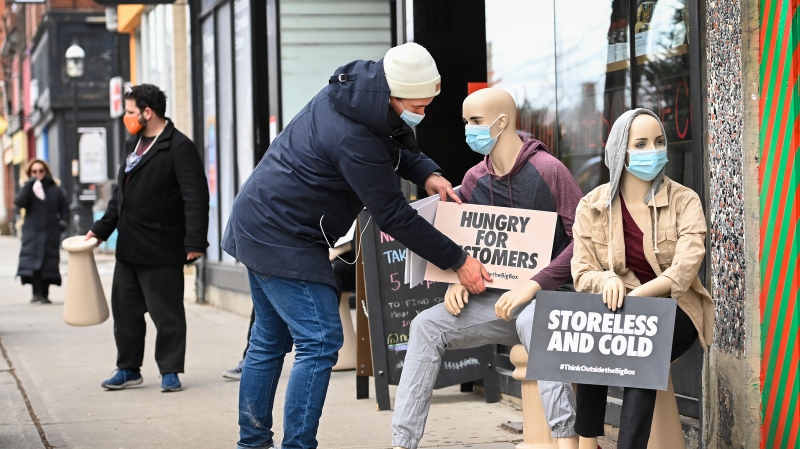

OTTAWA — A year into the pandemic, businesses that opened shop after March, 2020 are still being denied federal support, something the CEO of the Canadian Federation of Independent Business says is unacceptable.
Dan Kelly has long been pushing Ottawa to expand eligibility for programs like the Canada Emergency Wage Subsidy (CEWS), the Canada Emergency Rent Subsidy (CERS), and the Canada Emergency Business Account (CEBA) to allow new businesses to apply, some of which are facing the reality of having to close their doors.
“Despite promises from government to address this, there’s been zero action,” said Kelly in an interview with CTVNews.ca on Wednesday. “I’ve got small business owners, members of mine, that have spent $600,000 to open a 100-foot restaurant. They’d spent all the money pre-pandemic but the businesses started in say June and they are not eligible for any of the programs, not even the loan programs.”
While eligibility for each program differs slightly, they all require similar prerequisites.
The CEWS applies to individuals, corporations not exempt from income tax, registered charities, and non-profits with an active Canada Revenue Agency (CRA) payroll account on March 15, 2020, and who show a revenue decrease when compared to a similar time period the year prior. The CERS requires claimants to have a CRA payroll account by the same time or a business number on September 27, 2020, and also applies to those who have seen a drop in revenue from the pandemic, scaled based on scope of decline. The CEBA meanwhile, offers a substantial loan to an active operating business that is a sole proprietorship, partnership, or a Canadian-controlled private corporate in operation on or before March 1, 2020.
“Once CEBA, and the wage subsidy, and then later the rent subsidy came on board, it became quite obvious that newer firms, firms that have been established in 2020, but some in 2019, were slipping through the cracks,” said Kelly.
“I’ve talked to hundreds if not thousands of businesses that are absolutely apoplectic.”
In a press release issued on May 19, 2020, Prime Minister Justin Trudeau said the government would “work on potential solutions” to help ineligible business owners like new operators. Kelly said he’s followed up with Deputy Prime Minister and Finance Minister Chrystia Freeland on this but hasn’t been informed of a concrete plan.
A spokesperson for her office told CTVNews.ca in a statement that the “federal government continues to actively assess its support measures to ensure workers and businesses – including new businesses – have the support they need. We continue to welcome feedback from Canadians and businesses on how we can best be there for them, as we have done since the start of the pandemic.”
NDP MPs held a press conference about this very issue on Wednesday, alongside two struggling business owners from B.C. – one of whom forked over $100,000 of her own money to keep her business afloat over the winter.
“Since November we have been subsidizing our payroll out of our own pockets, every single week, in order to keep people employed. In the summer we had 35 employees and that got whittled down to 19, which was a terrible process,” said restaurant owner Scarlet Osborne.
“In my mind, really good governance requires creating an equitable playing field for small business in particular and in this case we feel we’ve been really let down.”
MP Gord Johns, also the party’s small businesses critic, said the government’s acted disingenuously in saying they stand by small businesses but haven’t yet delivered a support plan.
“It’s been a year. This is not fair to these small business owners who really are the unsung heroes of this pandemic. They closed their doors for public health and did the right thing and now they’re being penalized,” he said.
Kelly offered solutions to expand eligibility.
For the CEWS, as an example, he recommends instead considering the average revenue loss of similar businesses in a specific region and applying the corresponding support to the business in question.
“I understand it’s complicated, but we’re doing lots of complicated things right now,” he said. “If we have a hope of dragging Canada out of the COVID-19 recession, we’re going to need every business to be fully operational.”


